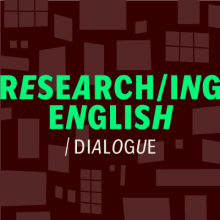Search VATE
e.g. Tales of Two Cities, VCE literature guide, membership...
Dialogue Seminar (online): How can English teachers prepare young people for an increasingly complex online world?

Description
Interstate ETA colleagues can email Katerina for registration (events@vate.org.au).
How can English teachers prepare young people for an increasingly complex online world?
Social media. Generative AI. Video streaming. Online forums. Photo-sharing. eShopping. Gaming. And so on and so on. There appears to be no end to the digital literacy practices of today’s youth.
While many express concerns about cyberbullying, online predators, and a reliance on digital technologies, others celebrate the unprecedented opportunities the digital world provides for creativity, connection and learning.
In this second Dialogue Seminar, we engage the concept of digital media literacies to explore how English teachers might centre digital technologies for critical attention. The demands of senior English curricula and external examinations minimise opportunities for the rigorous and sustained exploration of youth media practices. However, given the wide-spread embrace of digital technologies by Australian youth, there has arguably never been a more important time to revisit why and how English teachers should dedicate more attention to their students’ digital media worlds. How can we support students to be critical consumers and producers of social media? What do we need students to know about generative AI? How can media literacy evolve to explore data literacies? What might a shift towards the digital English classroom mean for the conceptual tools teachers deploy for learning?
Facilitated by Alex Bacalja (PhD), The University of Melbourne, this Dialogue will begin with a panel discussion with researchers whose expertise relates to youth digital technology use (both inside and outside of classrooms): Associate Professor Luci Pangrazio, and Leon Furze (PhD candidate), both from Deakin University. There will be an opportunity for teachers to discuss their contextual circumstances in small groups.
The online seminar will conclude by identifying the practical implications for integrating a critical orientation to digital media literacies in English.
The discussion at this Dialogue will centre around the research into digital media literacies circulated in the Research Snapshot No. 2 (to be circulated in Week 3 of Term Three). This is an opportunity for English teachers to deepen their understandings of theoretical standpoints, and to also critically examine English classroom approaches that centre digital media to position young people as critical media users.
Facilitator
Alex Bacalja, The University of Melbourne
With a background as a secondary English teacher, Alex has been involved in Initial Teacher Education for nearly a decade. His research employs qualitative case study approaches, informed by sociocultural literacies and postdigital thinking, to explore critical digital literacies and practices of young people both within and beyond formal schooling contexts. Alex's research interests focus on the impact of digital technologies, particularly digital games, on young people's literacy practices, and the implications for critical digital literacy education. He is actively engaged with the broader English teaching profession through school partnerships with the Victorian Association for the Teaching of English and the Australian Association for the Teaching of English.
Research Panellists
Associate Professor Luci Pangrazio, Deakin University
Luci is a Research Fellow in digital literacies at the Centre for Research in Educational Impact (REDI). She is currently studying datafication, data literacies and the gig economy. Her research interests include digital and data literacies, young people's digital worlds, the gig economy, platform studies and platform mediated labour, and creative and critical research methods. Luci's current DECRA project (2023-2026) is entitled 'Toward data justice in Australian schools'. She is also a Chief Investigator on the 'Australian Centre of Excellence for the Digital Child' (led by QUT, 2020-2027). Previous projects include 'Data Smart Schools: Enhancing the Use of Digital Data in Secondary' (led by Monash University, 2019-2021) and 'Data smart kids' (2018-2020) which involved working with Universidad de ORT Uruguay to
develop children's data literacies. Recent books include Critical Data Literacies (with Neil Selwyn, 2023, MIT Press), Learning to Live with Datafication: Educational Case Studies and Initiatives from Across the World (with Julian Sefton-Green, 2022, Routledge), and Young People’s Literacies in the Digital Age (2019, Routledge).
Leon Furze, Deakin University
Leon Furze is an international consultant, author, and speaker with over fifteen years of experience in secondary and tertiary education and leadership. Leon is studying his PhD in the implications of Generative Artificial Intelligence on writing instruction and education. Leon has held roles at multiple levels of school and board leadership, including Director of Teaching and Learning, Head of English, and eLearning. Leon is a Non-Executive Director on the board of Young Change Agents and Reframing Autism, and an outgoing member of Council for the Victorian Association for the Teaching of English. Leon completed his Master of Education at the University of Melbourne in 2016 with a focus on student wellbeing, leading schools through change, and linking education systems and communities. He has published dozens of books, articles and courses, with his most recent publications, Practical Reading Strategies and Practical Writing Strategies reaching an international audience. Leon presents at state and national conferences and runs online and face-to-face professional learning for schools, individuals and businesses. Through consultancy and advisory work, Leon helps educators from K-12 to tertiary to understand the implications of Generative Artificial Intelligence for education.
Cancellation Policy
Cancellations must be emailed to events@vate.org.au. Cancellations received by 12pm five working days prior to the event date will be charged a 15% cancellation fee. Cancellations received after this will receive NO REFUND. Registrations can, however, be transferred to another staff member. Please email events@vate.org.au the details. If you do not attend and have not notified VATE according to the above policy, you will receive no refund. Please note: If this event is cancelled due to COVID government or venue restrictions, you will receive a full refund.